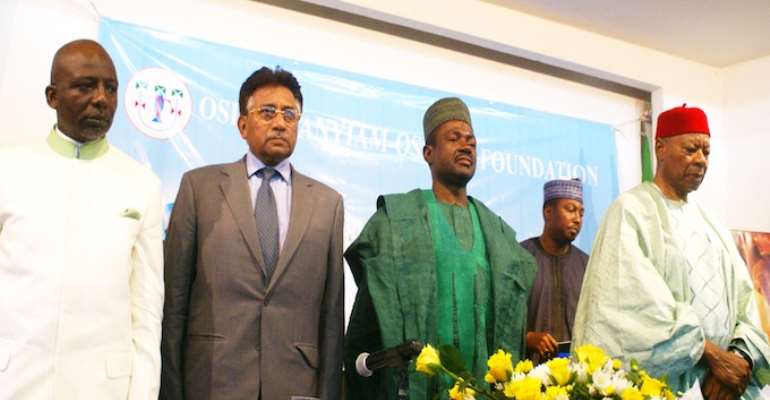Military Rule Divided Nigeria – Jonathan

LAGOS, Nov 26, (THEWILL) - Twenty-nine years of military rule destroyed and divided Nigeria’s social fabrics just as twelve years of democracy has given the Nigerians an opportunity to express their choice of whom they want in power, President Goodluck Ebele Jonathan has said.
President Jonathan spoke at the 12th session of the Osigwe Anyim-Osigwe Lecture Series held at the conference hall of the Nigerian Institute of International Affairs (NIIA) in Kofo Abayomi, Victoria Island, Lagos.
Jonathan, who was represented by the Minister of State for Information and Communication, Dr. Labaran Maku, gave Nigeria a pass mark considering that the country has been able to complete two successful transition programmes.
“We have experienced 13 and 16 years of military rule in the country. This translates to 29 years of military dictatorship which has left this nation broken and deeply divided. We still have a long way to go in this present democracy which is still maturing but we must be happy that we have had two successful transition programmes,” the President said. “The 12 years of democracy has given the entire people of Nigeria opportunity to choose leaders of their choice despite so many challenges. The present democracy is in maturing stage,” Jonathan added.
The President observed that there “is still no alternative to democracy and rule of law” which he said, his administration has put in the front burner, stressing that the process may be slow but it is the best way to development.
Jonathan also explained why his administration has embarked on electoral and political reforms to clear the political system of the ills of the past, saying these will go long way in establishing a strong and vital political system in the country.
“We have overhauled our electoral agency, we have given them the much needed fund and support and we have appointed a credible chairman for the electoral agency to give us a credible elections,” the President said.
He added that: “They (INEC) have also been cooperating with the National Assembly in putting enabling laws in place for the elections which will guarantee sanctity of the ballot box and where votes of Nigerians will count and their wishes are meet at the polls.
“By the grace of God we are going to see the cleanest and fairest election in the history of the country come next year. This administration is taking the issue of security and wealth creation which is an antidote to poverty seriously. The issue of power generation is also paramount for government, which to him makes economic development impossible if it is not in place,” Jonathan said.
The President said a roadmap for power generation, which he said had been put in place and could be seen in the 96 projects worth over N1.4 billion spread across the country.
Speaking on Democracy, former Pakistani President, General Pervez Musharraf said for any meaningful democracy to thrive, especially in a developing country in the third world, the leadership must be up and doing, saying where this is lacking there is bound to be a lot of problems.
According to Musharraf, leaders must ensure that there is equitable distribution of wealth across every region. “We have to ensure harmony, economic and collective development of every region. My own definition of good leadership is equitable distribution of the state resources and the equality of all sections of the country. There should be water security, food security, employment security, education security, welfare security,” he said.
Musharraf said the mere conduct of free and fair elections in any democracy does not mean that is the end of it all but it should be the beginning, adding that government should ensure that every segment of the society participate in governance and not the rich and the powerful alone as is the practice in most countries of the third world.
He said the success of Pakistani democracy today is because every segment of the society is part and parcel of the government and they are empowered, stressing that economic wellbeing of the populace plays a vital role for a country’s development.
The Pakistani leader said women in Pakistan “are economically empowered; the minorities and the people at the grassroots are part of government in Pakistan. We have also removed discriminatory laws against the minorities. In Pakistan, 4 out of 13 people in the National Assembly are women. Today, 73 women representing 20 per cent are in the National Assembly. This is a great success story of democracy in Pakistan,” The former Pakistani President added.
